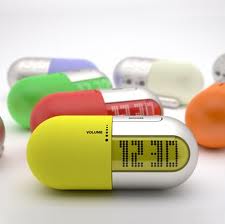 Steve Steiber, Ph.D., our vice president for senior services, completes his two part posting about how time of day of dosing can impact the effectiveness of a care receiver’s medications. Steve has more than two decades experience in pharmaceutical consulting prior to joining CCM about 8 years ago. He reports:
Steve Steiber, Ph.D., our vice president for senior services, completes his two part posting about how time of day of dosing can impact the effectiveness of a care receiver’s medications. Steve has more than two decades experience in pharmaceutical consulting prior to joining CCM about 8 years ago. He reports:
In the first installment on this subject, I had written about some of the general rules regarding when to take medications that are dosed once a day. In general, once a day doses should be taken at night. Let me get down to the differences across certain classes of drugs and the conditions they treat.
- Cholesterol – If your older loved one is taking any of the statins (e.g., Zocor, Lipitor, Crestor, etc.) to lower their cholesterol, they should be taken before retiring at night. Oddly, while much of the body is shutting down a bit, the liver produces more cholesterol after midnight than any other time of the day.
- Asthma – This condition is an early riser with a real spike in attacks between 4 a.m. and 6 a.m. Given how long it takes the inhalers to max out, it is recommended that the inhaled dose be taken in the afternoon in order to cover the early morning risk interval.
- Allergies – Allergic reactions will climb through the night and peak in the morning, so help your older loved one to take the single dose (for once a day) or one of the doses if the medication is a twice daily dose before retiring for the night for best coverage.
- Osteoarthritis – Dosing for this one should be dictated by when your older loved one is most active and will therefore be most pained. Read the label to see at what intervals the NSAIDs may be taken and back off from the high pain point by two to four hours.
- Reflux – There are two kinds of medications: proton pump inhibitors (PPIs) and H2 antagonists. PPIs are longer acting but slower to build up; once your loved one has reached an effective level, be sure that they dose before dinner so as to keep up the dose during the last meal of the day and through the night. With H2 blockers, have them dose as much as an hour ahead of dinner in order to cover the meal and night time. Why night time? Two to three times as much acid is produced in the stomach between 10 p.m. and 2 a.m. than at any other time.
- Hypertension – This gets more complicated with age. Have your older loved one take at least one of their medications before bedtime to cover their sleep time and the early morning spike. Younger individuals will have a natural lowering of BP at night, but older individuals with high BP may not have this dip, thereby exposing themselves to a greater risk of a cardiac event overnight.
As I emphasized in the first part of this series, be sure that you or your older loved one consults with their doctor before making any changes in their medication dosing. Be prepared also that older physicians simply may not be aware of some of this more current research on medicine and the body’s clock.
Please let Steve know if you have any questions about drugs, their side effects or the unique medical challenges faced by older adults or others with special needs. Please email to: Steve Steiber.




